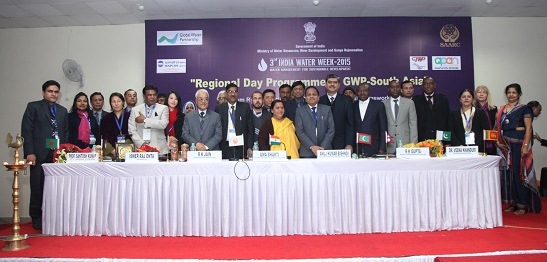Regional Day - a side event during India Water Week 2015; “From Risk to Resilience: South Asia Regional Framework for Sustainable Water Management” was held on the 15 January 2015 at Pragati Maidan, New Delhi. India Water Partnership (IWP) in collaboration with Global Water Partnership South Asia (GWP SAS), Water and Power Consultancy Services (WAPCOS) Limited, SAARC Disaster Management Centre (SDMC) and Asia Pacific Adaptation Network (APAN) organised the event bringing representatives and experts together from Afghanistan, Bangladesh, Bhutan, India, Maldives, Nepal, Sri Lanka. The discussions were on the South Asia regional experience, knowledge and case studies on efficient use of water to build more resilient societies to climate change and natural disasters.
The GWP delegation included Ms Angela Klauschen, Senior Network Officer, GWPO; Mr I. R. Onta, Chair; Ms Priyanka Dissanayake, Regional Coordinator; Mr Lal Indurwage, Programme Manager/WACREP, GWP SAS; Mr Sanjaya Dhungel, Senior Divisional Engineer, Water and Energy Secretariat, Nepal; Prof Champa Navaratne, Head of Department, Department of Agriculture Engineering, University of Ruhuna, Sri Lanka; Dr K. A. Haq, Vice President, Bangladesh Water Partnership; and Dr Lam Dorji, Chair of Bhutan Water Partnership. Ms Yi Ying Lee, Associated Coordinator of the Regional Hub for APAN represented APAN for the event.
The Chief Guest was Sushri Uma Bharti, Honourable Minister of Water Resources, River Development and Ganges Rejuvenation, Government of India. She emphasised in her inaugural speech that a wider consultative process among SAARC countries would pave the way for evolving a regional framework for action, to deal with impacts of climate change on South Asia's water resources. Mr Anuj Kumar Bishnoi, I.A.S., Secretary, Ministry of Water Resources, River Development and Ganges Rejuvenation, Government of India, in his keynote address mentioned, stress on water resources in South Asian is due to high level of population and poverty, urbanization and rapid economic growth of the region. He said basic sanitation and water quality are the key challenges in South Asia region which increases the pressure on water resources.
There were two Technical Sessions and a Valedictory Session followed by the inauguration. The first session was on Integration of Water Resources Management, Disaster Risk Reduction and Climate Change Adaptation. Drought monitoring system in India was presented and it was recommended that composite indicators to be used instead of an individual index. It was emphasized that the capacity of Rain Water Harvesting in the region should be enhanced to address water shortage and water quality problems. The post disaster response depends on local knowledge and capacity, therefore effective capacity-building within the context is critical for developing resilience. Strengthening knowledge and capacities of lowest government level and community and put to use in service to society and environment is required.
The technical second session was on developing a Joint Framework for Learning and Action for Effective and Sustainable Water Resources Management from a Disaster Risk Reduction (DRR) and Climate Change Adaptation (CCA) perspective in South Asia. A case study on Community Based Flood Early Warning System (developed by ICIMOD and Aranyak India) in Assam and Arunachal Pradesh (Brahmaputra River basin) was presented; it was endorsed that such systems are to be used in other river basins in South Asia and ensure the local communities have capacity to operate the systems. The session was concluded emphasising that there is no other way but to cooperate in a basin wide management level for effective and sustainable Water Resources Management.
